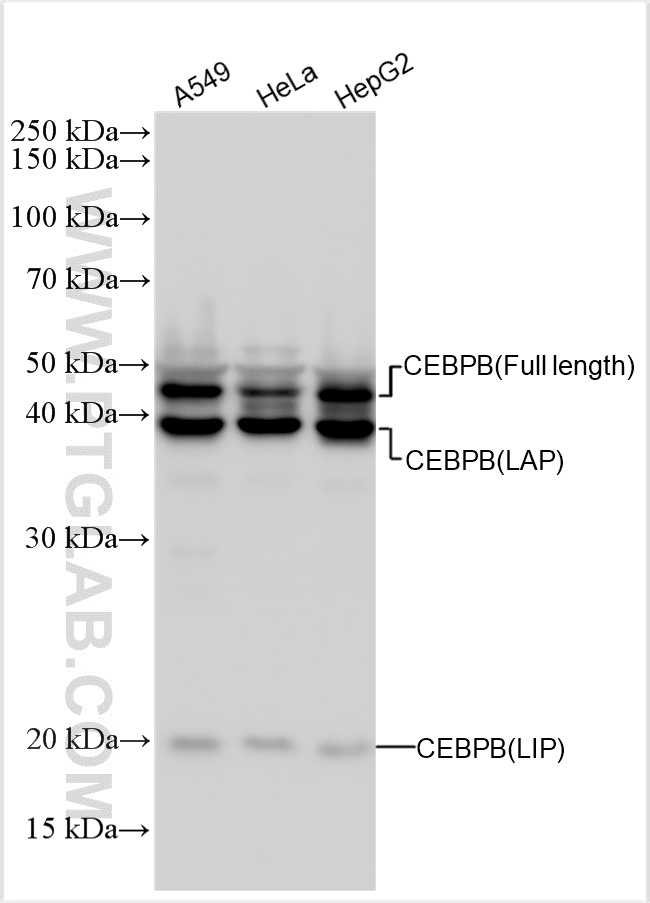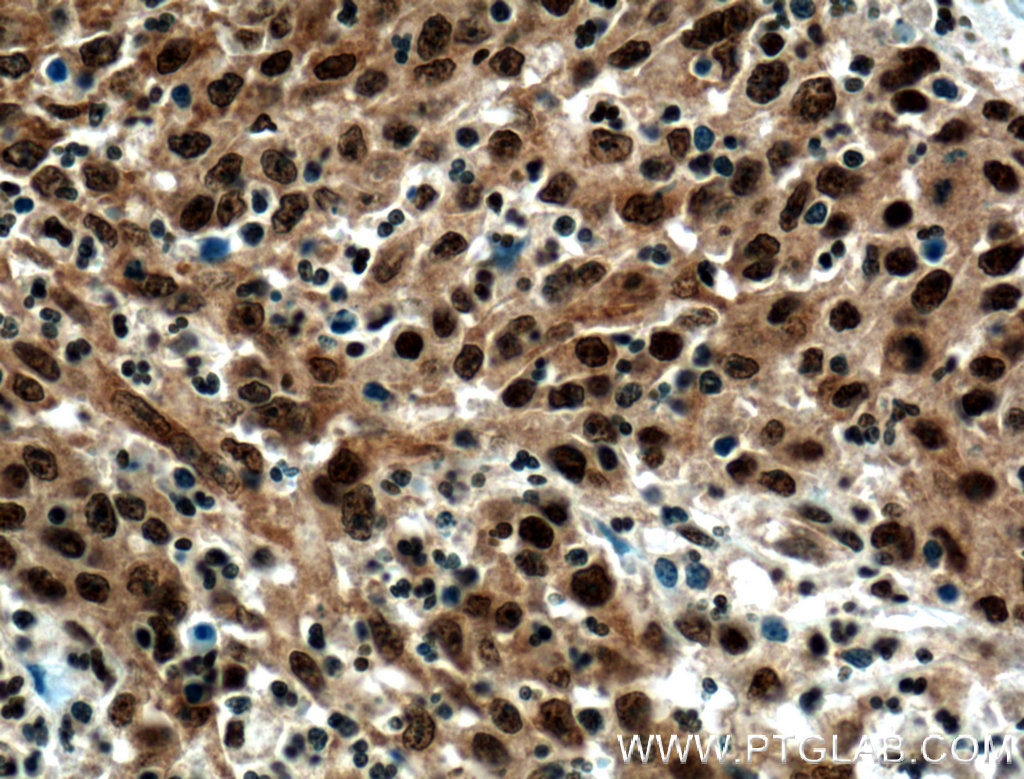验证数据展示
经过测试的应用
| Positive WB detected in | A549 cells, HeLa cells, HepG2 cells |
| Positive IHC detected in | human colon cancer tissue Note: suggested antigen retrieval with TE buffer pH 9.0; (*) Alternatively, antigen retrieval may be performed with citrate buffer pH 6.0 |
| Positive IF/ICC detected in | HeLa cells |
推荐稀释比
| 应用 | 推荐稀释比 |
|---|---|
| Western Blot (WB) | WB : 1:5000-1:50000 |
| Immunohistochemistry (IHC) | IHC : 1:50-1:500 |
| Immunofluorescence (IF)/ICC | IF/ICC : 1:200-1:800 |
| It is recommended that this reagent should be titrated in each testing system to obtain optimal results. | |
| Sample-dependent, Check data in validation data gallery. | |
产品信息
23431-1-AP targets CEBPB in WB, IHC, IF/ICC, CoIP, ChIP, RIP, ELISA applications and shows reactivity with human samples.
| 经测试应用 | WB, IHC, IF/ICC, ELISA Application Description |
| 文献引用应用 | WB, IHC, IF, CoIP, chIP, RIP |
| 经测试反应性 | human |
| 文献引用反应性 | human |
| 免疫原 |
CatNo: Ag20073 Product name: Recombinant human CEBPB protein Source: e coli.-derived, PGEX-4T Tag: GST Domain: 1-266 aa of BC007538 Sequence: MQRLVAWDPACLPLPPPPPAFKSMEVANFYYEADCLAAAYGGKAAPAAPPAARPGPRPPAGELGSIGDHERAIDFSPYLEPLGAPQAPAPATATDTFEAAPPAPAPAPASSGQHHDFLSDLFSDDYGGKNCKKPAEYGYVSLGRLGAAKGALHPGCFAPLHPPPPPPPPPAELKAEPGFEPADCKRKEEAGAPGGGAGMAAGFPYALRAYLGYQAVPSGSSGSLSTSSSSSPPGTPSPADAKAPPTACYAGAAPAPSQVKSKAKKT 种属同源性预测 |
| 宿主/亚型 | Rabbit / IgG |
| 抗体类别 | Polyclonal |
| 产品类型 | Antibody |
| 全称 | CCAAT/enhancer binding protein (C/EBP), beta |
| 别名 | C EBP beta, C/EBP beta, C/EBP related protein 2, C/EBPbeta, CCAAT/enhancer-binding protein beta |
| 计算分子量 | 345 aa, 36 kDa |
| 观测分子量 | 42 kDa,46 kDa |
| GenBank蛋白编号 | BC007538 |
| 基因名称 | CEBPB |
| Gene ID (NCBI) | 1051 |
| RRID | AB_2879278 |
| 偶联类型 | Unconjugated |
| 形式 | Liquid |
| 纯化方式 | Antigen affinity purification |
| UNIPROT ID | P17676 |
| 储存缓冲液 | PBS with 0.02% sodium azide and 50% glycerol, pH 7.3. |
| 储存条件 | Store at -20°C. Stable for one year after shipment. Aliquoting is unnecessary for -20oC storage. |
背景介绍
CCAAT/enhancer-binding protein beta (CEBPB), also known as LAP, is a important transcriptional activator in the regulation of genes involved in immune and inflammatory responses. It specifically binds to an IL-1 response element in the IL-6 gene. CEBPb mRNAs possess alternative translation-initiation codons, which result in the formation of truncated forms of the protein.Three variants of CEBPBs have been detected: a 46 kDa full-length liver-enriched transcription-activating protein (LAP1), a 42 kDa LAP2 and a 20 kDa liver-enriched transcription-inhibitory protein (LIP). (PMID:18820298). This antibody is specific to CEBPB.
实验方案
| Product Specific Protocols | |
|---|---|
| IF protocol for CEBPB antibody 23431-1-AP | Download protocol |
| IHC protocol for CEBPB antibody 23431-1-AP | Download protocol |
| WB protocol for CEBPB antibody 23431-1-AP | Download protocol |
| Standard Protocols | |
|---|---|
| Click here to view our Standard Protocols |
发表文章
| Species | Application | Title |
|---|---|---|
Adv Sci (Weinh) HIPK1 Inhibition Protects against Pathological Cardiac Hypertrophy by Inhibiting the CREB-C/EBPβ Axis | ||
J Immunother Cancer YY1 complex in M2 macrophage promotes prostate cancer progression by upregulating IL-6 | ||
Cardiovasc Diabetol NLRP3 inflammasome-modulated angiogenic function of EPC via PI3K/ Akt/mTOR pathway in diabetic myocardial infarction | ||
Aging (Albany NY) Functional rare variant in a C/EBP beta binding site in NINJ2 gene increases the risk of coronary artery disease.
| ||
Int J Mol Sci ERK1/2-CEBPB Axis-Regulated hBD1 Enhances Anti-Tuberculosis Capacity in Alveolar Type II Epithelial Cells | ||
Am J Physiol Cell Physiol The paracrine isthmin1 transcriptionally regulated by C/EBPβ exacerbates pulmonary vascular leakage in murine sepsis |




